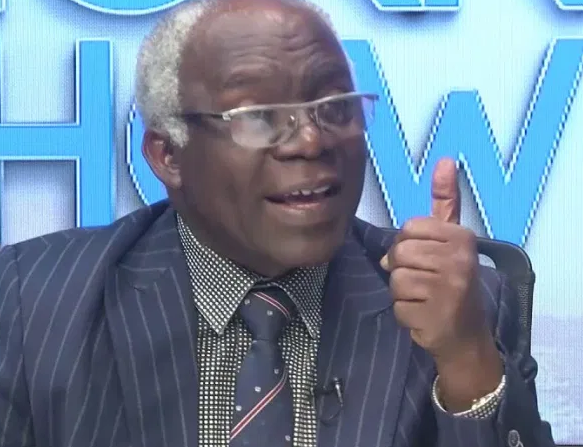No National Law On Grazing Routes, Falana, Basiru Tell Buhari

Human rights lawyer and Senior Advocate of Nigeria (SAN), Mr. Femi Falana, and the Senate spokesman, Senator Ajibola Basiru, have opposed President Muhammadu Buhari’s directive to the Attorney-General of the Federation and Minister of Justice, Mr. Abubakar Malami (SAN), to reclaim land for open grazing, saying there is no national law on open grazing.
Fielding questions on The Morning Show, a programme on ARISE NEWS Channel, the silk said contrary to the impression the president has created, Nigeria has no national law on cattle grazing routes.
He spoke against the backdrop of Buhari’s response to a question in an exclusive interview with ARISE NEWS Channel last Thursday that he had directed Malami to get an old gazette on grazing routes and reclaim the land for open grazing by herdsmen.
He stated that the president may have been misinformed by those who told him that Nigeria had a gazetted law on cattle routes and called for sanction against those who had misinformed the president.
He said:
Before 1964, Nigeria had an indigenous political class that was ruling the affairs of the regions during the colonial master’s reign in Nigeria.
That was when the grazing reserve law was enacted by the political class that was in charge of the northern region and the law was enacted for only the northern region, which was not applicable to all other regions of the country. The law was not enacted in the Western region, Mid-western region and the Eastern region.
At that time, regions like the Western region had ranches in Epe in the current Lagos State, Akunu in the current Ondo State, and Oke-Aku in the current Ekiti State. These ranches were established in 1956, under Obafemi Awolowo’s regime. We also had ranches in the Eastern region at that time. We had Obudu Ranch in the Eastern region that was established in 1951.
So Nigeria does not have a uniform policy in animal husbandry and open grazing. So, the call by President Muhammadu Buhari, telling Malami to make available the country’s national gazette on cattle routes for open grazing is misinformation on the part of those who informed the president that Nigeria had a gazette on cattle routes for open grazing because Nigeria had none, except for the northern region that was not applicable to all other regions of the country that were autonomous at that time.
Falana, however, said the grazing reserves of the First Republic had been seized by Ashanti farmers, adding that it would take a serious legal battle that would last for years, to reclaim them.
He said the Northern Governors’ Forum had earlier spoken against open grazing and had also announced that they had adopted the agriculture transformation plan of the federal government.
According to him, the federal government must be consistent with its policies, especially as it concerns open grazing since governance is a continuous process.
Giving reasons why Nigeria needs policy consistency, Falana said the government seemed not to be consistent with its policies, adding that inconsistency will lead to people’s mistrust.
He said in 2016, the then Minister of Agriculture, Chief Audu Ogbe, had announced that the Federal Government had acquired 55,000 acres of land in 11 states for cattle rearing.
He said the same government later came up with the idea of a cattle colony also called Ruga.
He stated that Ruga was opposed by most state governors who felt it was a means through which the federal government will acquire their land.
Falana added that in 2018, the Federal Government and states came up with the National Livestock Transformation Plan that will cost N100 billion and the states will provide N20 billion while the federal government will provide N80 billion.
He stated that in 2019, the Central Bank of Nigeria (CBN) Governor, Mr. Godwin Emefiele, had announced plans for Nigeria to ban the importation of milk because the country was spending between $1.2 billion and $1.5 billion yearly on milk importation.
Emefiele had added that the Federal Government would make loans available for cattle ranching.
In February this year, the entire 36 states governors had at a meeting agreed to discontinue open grazing and embrace ranching in line with the federal government’s policy. Later this year, the 17 South-south governors banned open grazing in Southern parts of the country. Most Northern governors have begun ranching in their various states and Kano State has invited all those cattle rearers who were displaced to come to Kano for ranching of their cattle and this is where we are today,
he added.
Falana called on Malami to brief Buhari on the level of development with regards to cattle ranching in Nigeria.
He said:
The president may mean well for the country but without cognisance of the level we are with cattle ranching and the Land Use Act that empowers every state governor the right to control land in their states.
The president of Nigeria does not have control over land outside of the Federal Capital Territory, according to the Land Use Act of Nigeria. So the federal government cannot acquire land from any state under the Land Use Act. So with the Land Use Act, the law on open grazing is no longer applicable.
He urged Buhari to withdraw his position on open grazing and align with the current Land Use Act.
Reacting to Malami’s comment condemning the ban on open grazing by the 17 Southern governors, and for defending the rights of cows to move around in any part of the country, Falana quoted Section 41 of the 1999 Constitution, as saying that the freedom of movement can only be applicable to human beings and not cattle or any kind of animals.
The law is very clear that humans have freedom of movement and not animals,
he stated.
On security in states, Falana said Buhari erred for saying that governors have control over security in their states, since the constitution vested power in the president to declare a state of emergency, without vesting such power in governors.
On the Federal Government’s position that Twitter and its Founder, Mr. Jack Dorsey, are vicariously liable for losses incurred during the #EndSARS protest in Nigeria, the learned silk said:
I heard the statement and I must confess that I was taken aback because the Honorable Minister of Information and Culture, Alhaji Lai Mohammed, is a senior lawyer; so, I expect that he knows the implication of his statement.
Again, this is why the government must ensure that it is consistent in its policies, otherwise, this country becomes a laughing stock in the comity of nations.
Also speaking on the same issue, the senator representing Osun Central Senatorial district, Basiru, yesterday said Buhari has not received well-informed and proper legal advice from Malami and his legal team.
Looking through all relevant laws pertaining to cattle grazing, there is in fact nothing to gazette because whether in the North or South there is no law of grazing routes,
the senator said.
He argued that neither in the North nor in the South has a law creating grazing routes either as state law or federal law, saying it is unfortunate that the president has been misadvised on the matter.
According to him,
The Grazing Reserves Laws in some states created from the former Northern Region of Nigeria are deemed to be state laws by Section 318 of the 1999 Constitution (as amended), having been adopted from the Grazing Reserve Law of Northern Region of Nigeria (NN Law of 1965).
For examples, CAP 3 Laws of Kwara State; CAP 56 Laws of Bauchi State; and CAP 55 Laws of Katsina State.
In the case of these laws, it was expressly stated that they are adopted from Northern Nigeria Laws of 1965. There is no provision for grazing routes as it is being claimed,
the senator explained.
Basiru added that there has never been federal legislation on Grazing Reserves and/or Grazing Routes in Nigeria, adding that the Northern Region Laws are not applicable everywhere in Nigeria.
According to him, by the present constitutional provisions, such a law cannot be within the competence of the National Assembly.
The Grazing Reserves Laws are only applicable and enforceable in those states created from the former Northern Regions that chose to adopt same as part of their revised laws like Kwara, Bauchi and Katsina States. It appears that Jigawa State omitted the Grazing Reserves Law as part of its law in the more recent compilation of its laws,
he added.
Further and be that as it may, none of the extant Grazing Reserves Laws made mention of grazing routes not to talk of making provisions thereof.
It was only in section 37(1) (a) of the law that the law mentioned ‘trade route’ in criminalising open grazing outside the grazing reserves areas.
However, what is ‘trade route’ was not defined in the law and there is no other reference to the term ‘trade route’ in the law. The purport of Grazing Reserve Law, contrary to the impression being sought to be created, is to create grazing reserve areas to be created with necessary legal requirements and criminalise grazing outside the grazing areas. Under those laws animals are only allowed to graze in the grazing reserve or ‘trade route,”
the senator explained.

Justin Nwosu is the founder and publisher of Flavision. His core interest is in writing unbiased news about Nigeria in particular and Africa in general. He’s a strong adherent of investigative journalism, with a bent on exposing corruption, abuse of power and societal ills.













